- Home
- Chris Willrich
The Silk Map Page 8
The Silk Map Read online
Page 8
Snow Pine returned with a satisfied look.
“There are several sources for old legends hereabouts, but the best is one Widow Zheng, who sells books not far down the great East-West Avenue. It’s too late to consult her tonight, but she is out and about most days. Now, about that bath.”
So they took up lodgings at the Inn of the Bright Future, only a modest step up from the Inn of Fond Remembrance next door, but at least the wood wasn’t rotting. Having purchased a room and meals, they took bowls of noodle soup with pigeon eggs bobbing inside and sat on a bench outside the inn, watching entertainers and candlelight and the heavenly show of stars easing into view within the deep blue of evening. Bone sliced and shared one of his watermelons, and they felt warm breezes tickle the dribble down their chins.
For a time they could forget hope and worry for their children, and behave as children themselves.
At dawn they left the Market while its vendors were rising and some of its entertainers were snoring. They entered the city’s great east-west road. Gaunt found it wider, cleaner, and more pleasant than the various paths they’d taken the day before, especially with a civic garden to their right. Peonies bloomed, their pink blossoms shining where the early sunlight caught them.
“It’s the Fourth Moon of the year,” Snow Pine said, head turned toward the flowers, “the Peony Moon.” Something hard entered her voice. “The peony’s a sign of love.”
Gaunt had a moment’s grief for her widowed friend, but in the next moment she’d seen something more beautiful to her than flowers. There were many peddlers’ carts parked along the street beside the garden. One collection of three had a sign above that might as well have been written in blazing characters: WIDOW ZHENG’S KNOWLEDGE EMPORIUM.
The carts were covered with books.
Gaunt stepped closer, hesitantly now, hardly believing her eyes. It had been a while since she’d seen so many works in one spot. Not just codices, but also scrolls, paintings, tablets, pamphlets . . .
Widow Zheng herself was a spry elder possessed of gray hair and a face that had seen rain and sand and war. Her gaze twinkled like a fisherwoman who’d felt a tug. Though slight of build, she unleashed a voice that bestrode the wild territory between a noble’s peroration and a carnival barker’s shout. “Knowledge! Rumor! Accounts of Ancient Days! Tales of Bandits and Kings! Yours for a Pittance!”
“We do not have a pittance . . .” Bone cautioned a little hopelessly.
“These things can be negotiated,” Gaunt said, drifting closer to Widow Zheng’s treasures.
“Aiya,” Snow Pine said, twisting her hair.
Gaunt’s gaze flitted over a menagerie of books, some proclaiming their contents, some not.
“You may open them, my dear,” said Widow Zheng, her voice now conspiratorial. “I know a fellow worshipper when I see her.”
“You must understand,” Gaunt said, “where I come from your cart would be considered a treasure-house.” She quickly passed hands and eyes (and nose, oh, the scent of paper, leather, and papyrus) over such works from Qiangguo as The Nightmare of the Crimson Citadel, and Lamentations of the Great Historian, and A Partial Reconstruction of the Classic of Music, from Such Fragments as Were Recovered from the Burning of the Books. There were alien texts as well. Some were in the flowing script of the Mirabad Caliphate, which Gaunt regretted never mastering. Others were in languages she did not recognize at all. However, her mouth watered over foreign books translated into the Tongue of the Tortoise Shell: A Mirror for Young Despots and A Discourse on Light and Darkness caught her eye, as well as an absurdly fat codex titled The Epic of the King Tutored by Wolves, the Savage Abridgment.
“You have a lot of books for someone with no shop,” Snow Pine dared to muse.
“Or outside a market,” said Bone.
“Ah, well,” Widow Zheng said, “I am fond of markets, but they are raucous places; here I can think. As for a shop, moving around a little protects customers who may not wish to be seen perusing the wares.” She patted a book labeled Precepts of a Moral Existence, whispering, “Unconventional people such as yourselves might appreciate the forbidden novel The Sweet Blossoming of Plums.”
Snow Pine looked thoughtful, and Gaunt smiled. (Bone was poking around nearby, muttering something about treasure maps.) The book sounded intriguing to be sure, and she suspected many a respectable home boasted a discreetly shelved copy of Precepts of a Moral Existence. Still, they only had so much coin and pack space, and though drawn by such words as Sweet, her heart was stirred more by notions like Nightmare, Burning, Wolves. Such was her nature. Yet most of all they needed intelligence about the Braid of Spice.
“Do you have anything about the Western Road?”
“Hm. Not much, I admit.” Widow Zheng plucked Lamentations of the Great Historian from the shelf. “This is probably the best. It includes a biography of the famous Envoy Da, whose four-year expedition to the West turned into forty. It always sells well. However, it must be admitted it’s centuries out of date.”
“Centuries!” Gaunt said. “Are there no more recent accounts?”
Widow Zheng said, “You must understand, most of my customers seek sensations, not facts as such. An old account is full of wonders and hearsay, and can transport you to a different realm. As such it provides amusement for the elite and escape for the commoner. Current facts aren’t the province of readers but of traders, who write nothing down but figures. Or of the regional governor, who keeps such facts to himself. Still, I suppose the mountains and the desert are still the mountains and the desert, even after five hundred years.”
Gaunt absorbed that figure, then handed over the sum of Widow Zheng’s next figure. Gaunt gripped her prize like a dog with a bird. She hoped she’d like the taste.
“I don’t suppose,” Snow Pine said, “it says anything about a fiery mountain in the West.”
Widow Zheng’s expression grew distant. “How strange. I thought I was the only person interested in such stories. No, Envoy Da never speaks of such a mountain. But once he describes an abominable roaring whose source he can never confirm, and days of ash-filled skies, and sunsets of a beautiful yet bloody hue.”
“As though a mountain had burned,” Gaunt mused.
“I do wonder. Ever since I was a girl I have loved a particular story about such a mountain. I will tell it briefly, as you are paying customers.”
WIDOW ZHENG’S TALE
Somewhere west of the sun, east of the moon, in the marvelous land of Maldar Khan, there lived a girl named Hui. She was a poor girl who’d appeared out of nowhere one day and was taken in by a kindly widower who eventually adopted her as his daughter. Now, the land of Maldar Khan lay upon mountains so tall the sun passed nearby to warm their peaks every day, and thus snow never formed on the heights, only the lower slopes. Maldar Khan’s people fashioned clever bridges of ice down below to connect their peaks and delved tunnels in the rock to serve as cities, while the mountaintops were a paradise of farms and gardens. Hui lived on the remotest peak, where there were only a few farms, but it was also the second tallest, and thus she had a clear view of Maldar Khan’s peak.
Only on that one mountaintop was a great construction permitted, and Maldar Khan’s temple-palace was a glory of the world, a thousand-windowed fortress covered in gold. The fortress was sometimes mistaken by those far below as the morning or evening star.
The lands of Maldar Khan were lost in haze to the rest of the world, but the khan possessed a fantastic crystal lens with which he could view all the doings of humankind. And at noontime, should wrath ever possess him, he could use the lens to focus the rays of the sun and bring fire and woe to the lands below. But he had only one such moment of wrath, and that was yet to come.
Now Hui possessed one oddity aside from the strangeness of her arrival, and that was her collection of glimmering oval stones, whose origins were as mysterious as her own. She would sing to them and whisper to them and sometimes weep over them.
One day sh
e told her father she must go on a journey to the tallest peak, Maldar Khan’s peak, and as she had come into her womanhood, he could not forbid her. It was normal for young people to make pilgrimage to the temple-palace, and sometimes they met their future spouses thereby. Yet Hui’s father feared for her, for while he loved her, her origins were mysterious, and she appeared foreign and strange.
Hui filled a pack full of food and her strange rock collection, and journeyed down to the empty tunnels of that peak, crossing its sole ice bridge.
Of her many exciting encounters, with snow serpents and wind sprites, with corrupt townsfolk on the next peak and with shadow-squids in the tunnels, I could talk the whole night. But suffice to say she reached Maldar Khan’s peak and joined the throng of young people always milling about the temple-palace.
Now Maldar Khan was the name of the holy ruler—as it was the name of his father and his father’s father. For it was not held in that land that a holy man must avoid a woman’s touch. And indeed, the young Maldar Khan had a growing interest in women and had announced a bright and beautiful gathering of dancing and merriment, for he thought by this means to discover his future wife. And all the youth were speaking of this event that would come the following month, and by which they too hoped to divine the face of a new beloved.
Thus preoccupied, no one noticed when Hui slipped away. For her object had never been the temple-palace but rather the highest pinnacles of that peak. Hidden by twilight she buried her stones there, for a purpose only she knew.
But while she knelt upon that height, she chanced to look toward the temple-palace. Maldar Khan was polishing his great lens, and for the moment it was reversed in its mounting. By some magic of timing and clear mountain air, she looked through the lens and glimpsed the young man’s thoughtful face. She was smitten.
Her thoughts turned for the first time to the glittering gathering a month hence. She could attend, for all were invited. But although no one starved in that wondrous land, she was poorest of the poor, and she didn’t believe she could join the others’ merriment in her tattered garb. She returned home, hoping with her father’s help she could weave a suitable dress.
When she returned, Hui was shocked to learn that in the intervening weeks her father had remarried, for in Hui’s absence loneliness had clutched at his heart like a cold mountain wind. He had married a passionate but selfish young woman of a neighboring peak, one who was just discovering that married life involved work. The arrival of a dutiful daughter stirred conflicting feelings in Hui’s new stepmother. On the one hand, she was jealous that her husband had affection for anyone else.
On the other hand, she saw in Hui an able servant.
Thus began a time of torment, for her stepmother piled chore after chore upon Hui, and her father seemed too bewitched to defend her. She was forbidden to attend the gathering, and soon there was no time to make the journey, let alone a dress.
Yet there were forces who took pity on Hui.
Strange fairy butterflies came to her. They wove her a dress of magical silk and carried her off to the palace, all in one night. They warned her of one thing, however—at midnight her magical silken dress would turn to iron.
At the temple-palace Hui laughed and sang and danced with the khan himself, and he was dazzled by this vision of beauty. Just as she worried about the time, the khan invited her to his observatory. How could she say no?
He entranced her with talk of strange lands and distant stars; and she entranced him by listening and sharing her own ideas. It turned out she knew far more of distant places than any in his realm, and he marveled at her learning. So taken were they with each other that Hui lost all track of time.
Suddenly her dress turned to iron.
Now, there were guards near the khan everywhere he went, and they were sworn to defend him. Thus when his strange guest’s silken dress turned at once to armor, or so they thought, they believed an assassin had snuck past them. In fear and shame they charged the startled Hui, and in that moment of confusion she tumbled off the balcony of the observatory, which rose from a sheer precipice. The khan grabbed at her iron collar, which snapped as Hui plunged. Hui fell to her death upon a snowy peak far below.
Strangely, the collar had turned back to silk. Maldar Khan tied it around his neck and never removed it.
The khan’s misery knew no bounds. He believed he’d found the love of his life, only to lose her. The following noon he trained his blazing lens upon the peak that was her grave, making the glaciers weep. Day after day he sent deadly rays upon that mountain, until they awakened an ancient fire within. To this day it belches flame and smoke, so that sometimes all of Maldar Khan’s realm, and even lands beyond, can see what darkness he carries in his heart.
Gaunt and Snow Pine shared a look. “That was a sad tale,” Snow Pine said, and Gaunt added, “And a strange one.”
Bone said, “There are many details that perplex.”
“Indeed,” said Widow Zheng, “it’s often that way with old tales.”
“Do any versions give directions to that land?”
“‘West’ is all they say. But you don’t think it’s a real place, do you?”
Bone shrugged. “You said traders might have better intelligence,” Bone said. “You’ve seen them come and go. Who would you consult with questions about the Braid?”
“That would depend greatly on what I wanted to do, youngster. And how you are asking.”
Bone smiled and bowed. He passed her a coin. Gaunt saw him wince a little. It wasn’t a pittance. “Suppose what you wanted to do, Grandmother,” he said, “was buy yourself a little something, and what I wanted to do was hunt treasure.”
Zheng grinned and pocketed the coin. “This old body’s impressed by your courtesy, outlander. Treasure hunting, eh? Sounds exciting.” She lowered her voice. “Perhaps you’re in the market for Living Calligraphy? I’m skilled in the art. I have scrolls that can shed light, and scrolls that can capture wild animals, scrolls that heal wounds, and scrolls that can seek objects.”
Bone’s mouth twitched at her words, then frowned at the figure she quoted.
“Well, no matter,” Widow Zheng said. “Now, as for informants . . . hm. The guy you really want is Katta. Crazy Yi, they call him around here. But he hasn’t been seen in these parts in years. They tried to lock him up for attacking an official, but Katta was always slippery. They say he’s blind but has a kind of sixth sense. They also say he probably won’t be back. Which is too bad, because he knew the sands like a Karvak knows horses. And also because he was a cute fellow. Though word is he has no use for women—”
Gently, Snow Pine said, “Grandmother, are there any others you’d recommend?”
“Hm. Maybe you should look up Geshou Pi and Long Bi.”
“‘Singer Flint’ and ‘Dragon Brush?’” said Snow Pine. “Strange names.”
“I don’t think those are their real names,” said Zheng. “They’re foreigners like you two. Though they speak the language better, no offense. Treasure hunters too, to hear them talk. Always on the lookout for something shiny. They ply me with wine for stories sometimes.” She smiled a little, at some memory. “And a little more in Long Bi’s case.”
“We don’t have a lot of shiny,” said Gaunt.
“Widow Zheng’s looking out for you, children. Tell them I sent you. They’re always badgering me for books, and I’ve loaned them a few. Remind them I’m expecting a couple back. They’re in the Western Market, in a shadowy place between the Inn of Infinite Options and the shrine of the god of literature. It’s called the Alley of the Scholars of Life.”
Back at the Inn of the Bright Future, chewing on melon, Bone looked across the now bustling Market toward the place Widow Zheng had described. It was the most dilapidated area in sight. He gnawed on a rind.
Gaunt said, “Snow Pine. Friend. I ask that you stay here, with our gear.”
“I’ll remind you, sister, I’m the only one of us truly competent with a sword. And the onl
y native of Qiangguo.”
Bone chewed thoughtfully before sliding his belt so as to conceal a dagger beneath the wedge of watermelon in his lap. Covertly he broke the wax seal. He shifted his belt back to its normal position.
“True,” Gaunt conceded. “However, it sounds as though these men are outlanders—not our folk, probably, but not yours either. As for trouble . . . Bone and I are used to playing that particular duet. But we’ll want to be unencumbered.”
Snow Pine looked for a moment as if she might argue. Instead she sighed. “And, this doesn’t seem like a part of town one wants to abandon one’s pack. Very well. Take the last melon along, Bone. When conducting business it’s good to offer a gift. Given their offices, I doubt they’ll be expecting jade.”
“Mmph,” Bone said agreeably, mouth full of melon.
There were a couple of turbaned people on the bench outside the Inn of Infinite Options, watching the ebbing activity of the Market, and a man in scholar’s robes bowing at the shrine of the literature god, but it was otherwise a quiet nook. The alley between these establishments contained a few shadowy offices, marked with intriguing titles: Jin Huang, knowledgeable about documents and dice games; Shi Lan, fearless soothsayer; Lei Chao, one who can apply sense into the thickest of skulls, and who has many brothers.
Each was accompanied by an illustration—a pair of dice upon a scroll, a cicada upon a scroll, and a scroll hitting a head in the manner of a truncheon.
At the very end they found a door labeled in questionable calligraphy: Geshou Pi and Long Bi, Lost Treasures, Lost Cities, Lost Causes.
The illustration was of a hand clutching a scroll in an upright fashion, its tip blazing like a torch.
The door was slightly ajar, and there was a weak glow from an alchemical fire-gem. Gaunt knocked, and there was no answer. She pushed the door open with her boot. They advanced into the dim.

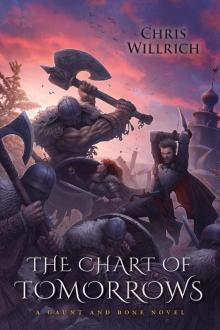 1633880583 (F)
1633880583 (F)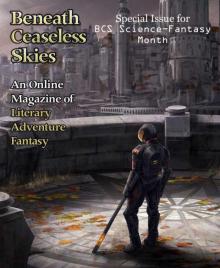 Beneath Ceaseless Skies #90
Beneath Ceaseless Skies #90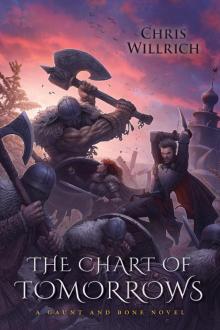 The Chart of Tomorrows
The Chart of Tomorrows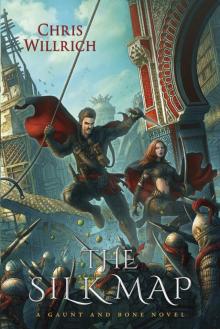 The Silk Map
The Silk Map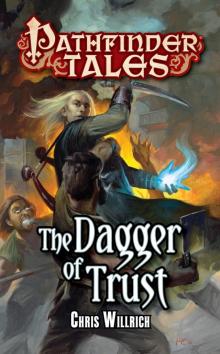 The Dagger of Trust
The Dagger of Trust